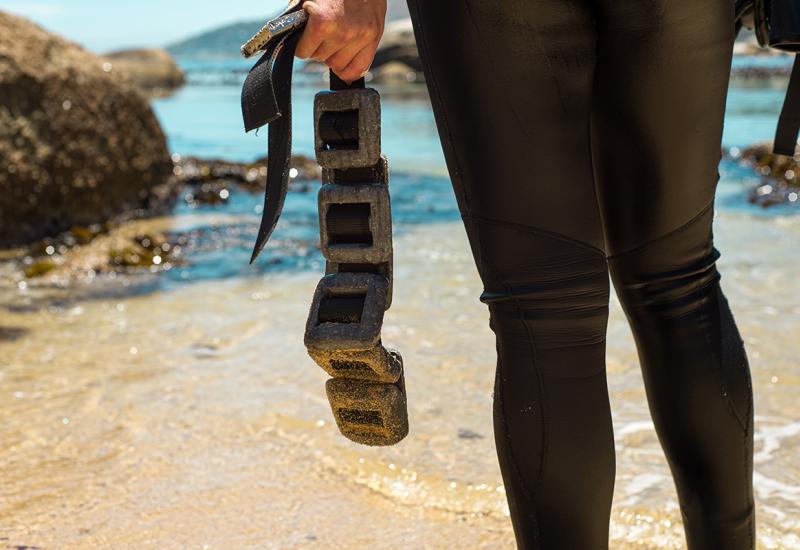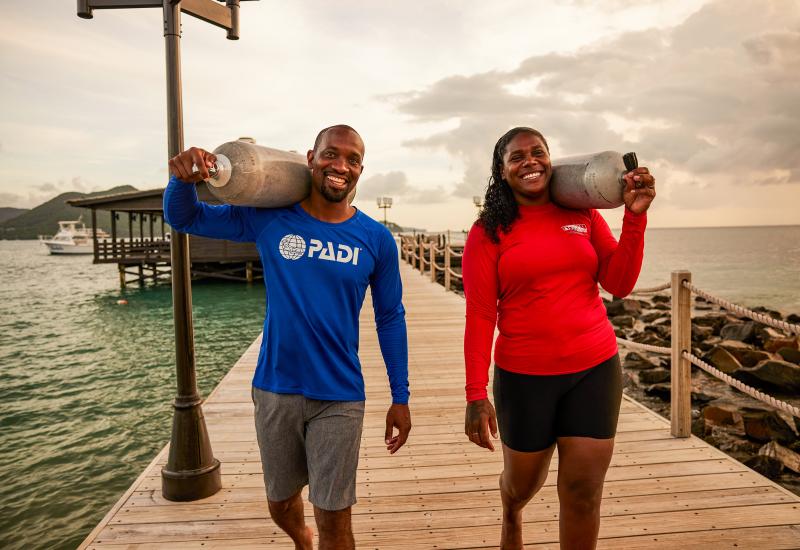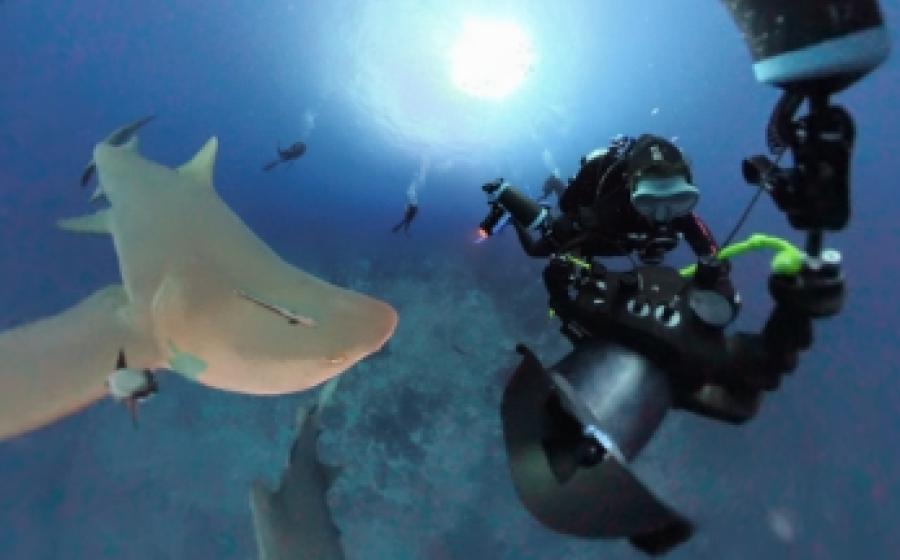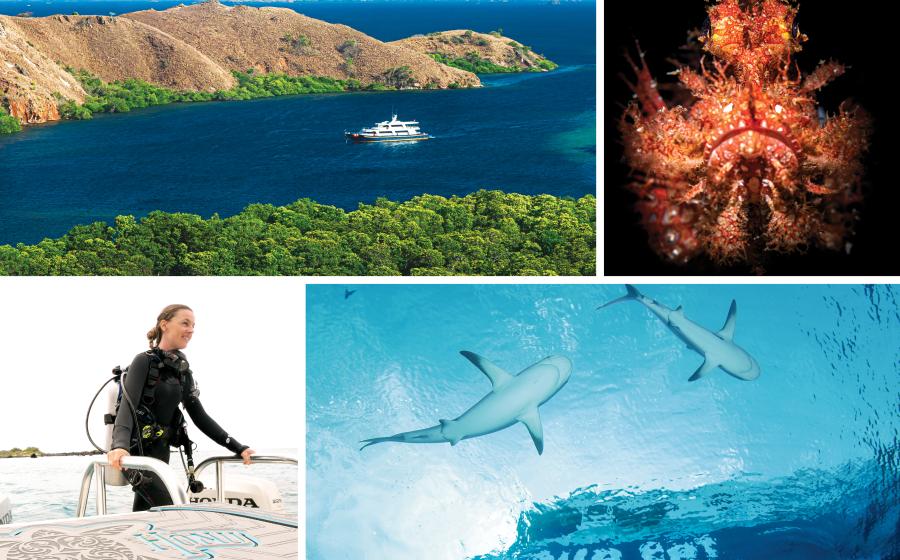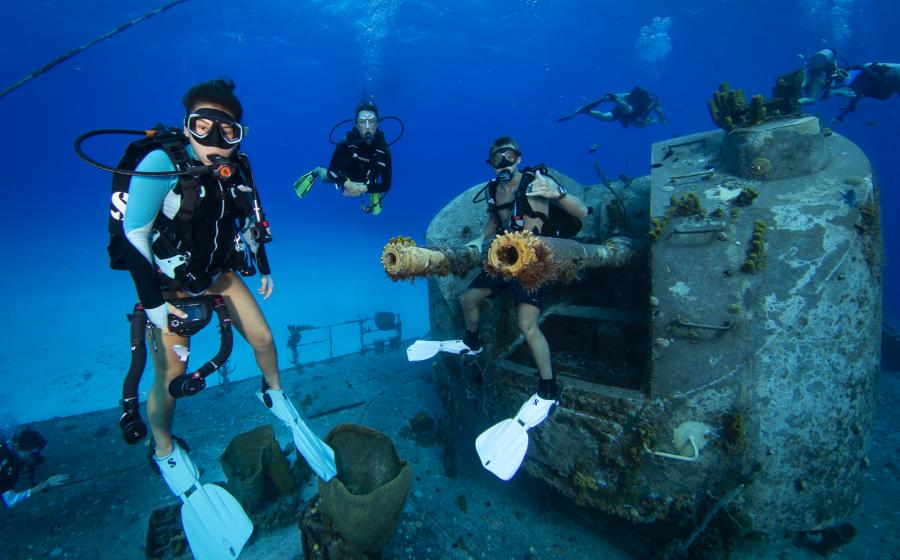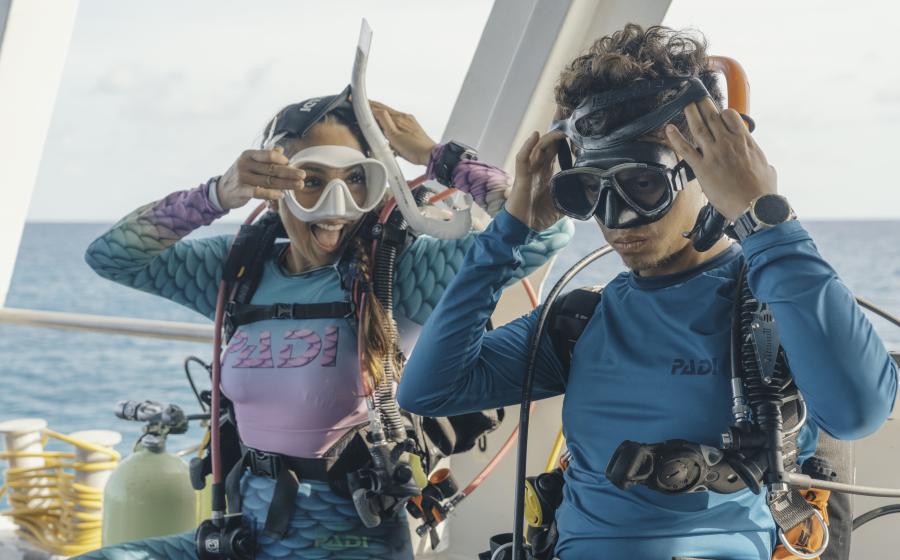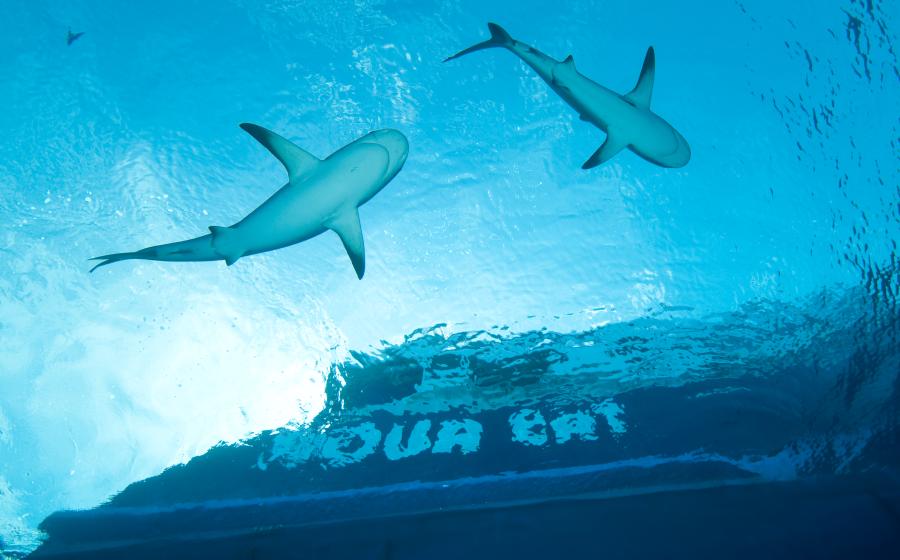Ask An Instructor - February 2007
By Michael Ange
Q: My 12-year-old son says he wants to get certified, but I'm not sure he's ready. Is it really safe to certify kids at his age?
A: The decision to enroll any child in a junior certification class (the minimum age is actually 10 for some training agencies) is in many respects no different from the decision to let them participate in other sports. It really depends on the individual kid's mental, physical and emotional maturity to handle the activity more than the simple passage of time. Some children may be ready at this tender age; many are not.
As you consider this decision, keep in mind that for children under the age of 16, certification is still a provisional matter. Most agencies require a parent or a certified adult to dive with the child, and there are often restrictions on when and how deep the child may dive. However, even with these limits, the physical risks and demands of diving, not to mention the need to understand the physics and physiology of the sport, are the same for kids as they are for adults.
If you are serious about enrolling your son, consult a professional instructor in your area who specializes in teaching kids. Together, you can evaluate his level of academic comprehension, emotional maturity, physical skills and comfort in the water. If the instructor thinks your kid is up to the challenge, there's one more hard question I want you to ask yourself: Would your child be an effective dive buddy if you were the victim in a diving emergency? When you can answer that question with a confident, unqualified "yes," chances are your son is ready.
The fact that you have doubts indicates your answer to that question today is "no." And that's OK. Waiting until the time is right is not only a safer approach, it also means your son will have more fun with diving when he does start.
Q: What tips do you have for beating occasional bouts of mild seasickness without pills, bands or home remedies?
A: Beating seasickness the chemical-free way starts before you set foot on the boat. If you know you are prone to mal de mer, avoid spicy foods the night before a dive. And skip the scrambled eggs and greasy bacon the morning of your trip. Foods like muffins, toast and bagels are much less likely to increase the effects of any nausea that might occur on board.
On the boat, think strategically about where you're going to sit for the duration of the trip. Avoid any place below deck where you cannot see the horizon. A fixed visual reference will help your balance mechanism make sense of the confusing signals that trigger motion sickness. You should stay away from the bow, the stern and the flying bridge, the areas of the boat that experience the most movement. And because nothing triggers a bout of involuntary chumming like strong, unpleasant odors, avoid the engine spaces, exhaust fumes and dank, poorly ventilated heads.
Many people don't start getting seasick until the boat anchors on site and begins bobbing on the waves. If you're one of them, ask the captain or mate to give you a warning a few minutes before the boat arrives so you can suit up while the boat is still in motion and things are relatively stable. Finally, once the boat is at anchor, do everything you can to expedite getting into the water. Once you're below the surface, seasickness won't be an issue.
Q: I just got certified and I'm ready to start buying gear. Any advice on what to buy first?
A: Congratulations and welcome to the club! Buying your own gear is going to be a lot of fun, and it's a smart investment in a lifetime of diving enjoyment. But I don't recommend you rush out and buy an entire set all at once. In fact, most divers actually take it slow and accumulate their gear over the span of six months to a year.
My advice is to focus on the personal equipment that can affect your comfort. Presumably, you already have your mask, fins and snorkel since these are typically required in certification classes, so the first purchase on my list would be a good-quality exposure suit for the conditions you're most likely to dive. (A little disclosure: In addition to being a dive instructor and columnist, I am also the U.S. sales manager for a wetsuit company, but my advice would be the same if I weren't in the neoprene business.) When shopping for a wetsuit, the most important thing to look for is fit. Come to the shop prepared to try on several different brands and styles until you find one that is snug, but not too tight, and has no gaps or folds. Depending on conditions, you may also need other exposure items, like a hood, gloves and boots.
Next on my priority list would be a good regulator system--a well-matched primary reg, octopus reg and gauge console. If you're saving up to purchase gear, keep renting until you can afford to purchase the entire system together. Assembling it piecemeal doesn't make a lot of sense, and renting also gives you the time and experience to learn what you like and dislike in a regulator. Extensive testing by Scuba Lab shows that virtually all major-brand regulators sold in reputable dive stores will deliver the air you need at recreational diving depths, regardless of price or style. That means you're free to focus on finding a comfortable reg that has all of the features you want, and none of the ones you don't. For more information on the range of regs (and every other diving product) on the market today, visit www.scubadiving.com/gear. Don't be afraid to ask the dive store staff any questions you have about the regulators they carry.
Your BC is one of the most complex pieces of dive gear, and there are several different styles to choose from. Try to rent and use various models as you gain experience. Chances are you learned to dive in a simple, stable jacket-style BC, and that's a good choice for a beginning diver. One difference between the rental you used in class and the BCs for sale at the dive store may be an integrated-weight system. It's important that you understand how this system works, that you can reach the weight pockets and ditch them easily--without looking--in an emergency. When you're trying BCs on for size, practice loading and ditching the weight system to make sure it will work for you.
Finally, don't forget a dive computer. Tables have their place, but diving is a lot more fun when the machines do the math for you. Your choices range from simple, stand-alone, air-only number crunchers to hoseless air-integrated multi-gas computers with a range of advanced functions. For new divers, I recommend a keep-it-simple approach. Forget about all the extra bells and whistles for now, and look for a machine that gives you the basic data you absolutely need--depth, bottom time, safe time remaining--in an easy-to-read, intuitive layout.
One final piece of advice: Don't introduce more than one new gear item per dive. Too many new toys can create task overload and distract you from the reason you bought all this stuff in the first place--enjoying the underwater environment.
Q: I've heard stories of divers hitting the O2 bottle in order to recover from hangovers before that first dive of the day. Is it true that breathing oxygen will "cure" a hangover?
A: While I do know people who swear by the concept, I suspect that oxygen therapy as a "hangover helper" is just a placebo effect. Breathing oxygen doesn't do anything for dehydration, the biggest cause of those painful hangover symptoms. Dehydration also dramatically increases your risk of DCS, so rather than hitting the oxygen bottle, a hung-over diver is probably better off hitting a water bottle instead--then taking two aspirin and going back to bed. It should go without saying that anyone who boards a dive boat hurting from a night of hard drinking is not in peak physical or mental condition to dive. And under no circumstances should anyone even think about tapping into the boat's emergency oxygen kit to treat a hangover. It's there for real dive emergencies, and I'm afraid your twisted stomach and pounding head don't meet that definition, no matter how much they hurt.
Got a question you need answered?
E-mail it to [email protected], or write to Ask An Instructor, 6600 Abercorn St., Suite 208, Savannah, GA 31405. safe.
By Michael Ange
Q: My 12-year-old son says he wants to get certified, but I'm not sure he's ready. Is it really safe to certify kids at his age?
A: The decision to enroll any child in a junior certification class (the minimum age is actually 10 for some training agencies) is in many respects no different from the decision to let them participate in other sports. It really depends on the individual kid's mental, physical and emotional maturity to handle the activity more than the simple passage of time. Some children may be ready at this tender age; many are not.
As you consider this decision, keep in mind that for children under the age of 16, certification is still a provisional matter. Most agencies require a parent or a certified adult to dive with the child, and there are often restrictions on when and how deep the child may dive. However, even with these limits, the physical risks and demands of diving, not to mention the need to understand the physics and physiology of the sport, are the same for kids as they are for adults.
If you are serious about enrolling your son, consult a professional instructor in your area who specializes in teaching kids. Together, you can evaluate his level of academic comprehension, emotional maturity, physical skills and comfort in the water. If the instructor thinks your kid is up to the challenge, there's one more hard question I want you to ask yourself: Would your child be an effective dive buddy if you were the victim in a diving emergency? When you can answer that question with a confident, unqualified "yes," chances are your son is ready.
The fact that you have doubts indicates your answer to that question today is "no." And that's OK. Waiting until the time is right is not only a safer approach, it also means your son will have more fun with diving when he does start.
Q: What tips do you have for beating occasional bouts of mild seasickness without pills, bands or home remedies?
A: Beating seasickness the chemical-free way starts before you set foot on the boat. If you know you are prone to mal de mer, avoid spicy foods the night before a dive. And skip the scrambled eggs and greasy bacon the morning of your trip. Foods like muffins, toast and bagels are much less likely to increase the effects of any nausea that might occur on board.
On the boat, think strategically about where you're going to sit for the duration of the trip. Avoid any place below deck where you cannot see the horizon. A fixed visual reference will help your balance mechanism make sense of the confusing signals that trigger motion sickness. You should stay away from the bow, the stern and the flying bridge, the areas of the boat that experience the most movement. And because nothing triggers a bout of involuntary chumming like strong, unpleasant odors, avoid the engine spaces, exhaust fumes and dank, poorly ventilated heads.
Many people don't start getting seasick until the boat anchors on site and begins bobbing on the waves. If you're one of them, ask the captain or mate to give you a warning a few minutes before the boat arrives so you can suit up while the boat is still in motion and things are relatively stable. Finally, once the boat is at anchor, do everything you can to expedite getting into the water. Once you're below the surface, seasickness won't be an issue.
Q: I just got certified and I'm ready to start buying gear. Any advice on what to buy first?
A: Congratulations and welcome to the club! Buying your own gear is going to be a lot of fun, and it's a smart investment in a lifetime of diving enjoyment. But I don't recommend you rush out and buy an entire set all at once. In fact, most divers actually take it slow and accumulate their gear over the span of six months to a year.
My advice is to focus on the personal equipment that can affect your comfort. Presumably, you already have your mask, fins and snorkel since these are typically required in certification classes, so the first purchase on my list would be a good-quality exposure suit for the conditions you're most likely to dive. (A little disclosure: In addition to being a dive instructor and columnist, I am also the U.S. sales manager for a wetsuit company, but my advice would be the same if I weren't in the neoprene business.) When shopping for a wetsuit, the most important thing to look for is fit. Come to the shop prepared to try on several different brands and styles until you find one that is snug, but not too tight, and has no gaps or folds. Depending on conditions, you may also need other exposure items, like a hood, gloves and boots.
Next on my priority list would be a good regulator system--a well-matched primary reg, octopus reg and gauge console. If you're saving up to purchase gear, keep renting until you can afford to purchase the entire system together. Assembling it piecemeal doesn't make a lot of sense, and renting also gives you the time and experience to learn what you like and dislike in a regulator. Extensive testing by Scuba Lab shows that virtually all major-brand regulators sold in reputable dive stores will deliver the air you need at recreational diving depths, regardless of price or style. That means you're free to focus on finding a comfortable reg that has all of the features you want, and none of the ones you don't. For more information on the range of regs (and every other diving product) on the market today, visit www.scubadiving.com/gear. Don't be afraid to ask the dive store staff any questions you have about the regulators they carry.
Your BC is one of the most complex pieces of dive gear, and there are several different styles to choose from. Try to rent and use various models as you gain experience. Chances are you learned to dive in a simple, stable jacket-style BC, and that's a good choice for a beginning diver. One difference between the rental you used in class and the BCs for sale at the dive store may be an integrated-weight system. It's important that you understand how this system works, that you can reach the weight pockets and ditch them easily--without looking--in an emergency. When you're trying BCs on for size, practice loading and ditching the weight system to make sure it will work for you.
Finally, don't forget a dive computer. Tables have their place, but diving is a lot more fun when the machines do the math for you. Your choices range from simple, stand-alone, air-only number crunchers to hoseless air-integrated multi-gas computers with a range of advanced functions. For new divers, I recommend a keep-it-simple approach. Forget about all the extra bells and whistles for now, and look for a machine that gives you the basic data you absolutely need--depth, bottom time, safe time remaining--in an easy-to-read, intuitive layout.
One final piece of advice: Don't introduce more than one new gear item per dive. Too many new toys can create task overload and distract you from the reason you bought all this stuff in the first place--enjoying the underwater environment.
Q: I've heard stories of divers hitting the O2 bottle in order to recover from hangovers before that first dive of the day. Is it true that breathing oxygen will "cure" a hangover?
A: While I do know people who swear by the concept, I suspect that oxygen therapy as a "hangover helper" is just a placebo effect. Breathing oxygen doesn't do anything for dehydration, the biggest cause of those painful hangover symptoms. Dehydration also dramatically increases your risk of DCS, so rather than hitting the oxygen bottle, a hung-over diver is probably better off hitting a water bottle instead--then taking two aspirin and going back to bed. It should go without saying that anyone who boards a dive boat hurting from a night of hard drinking is not in peak physical or mental condition to dive. And under no circumstances should anyone even think about tapping into the boat's emergency oxygen kit to treat a hangover. It's there for real dive emergencies, and I'm afraid your twisted stomach and pounding head don't meet that definition, no matter how much they hurt.
Got a question you need answered?
E-mail it to [email protected], or write to Ask An Instructor, 6600 Abercorn St., Suite 208, Savannah, GA 31405. safe.



